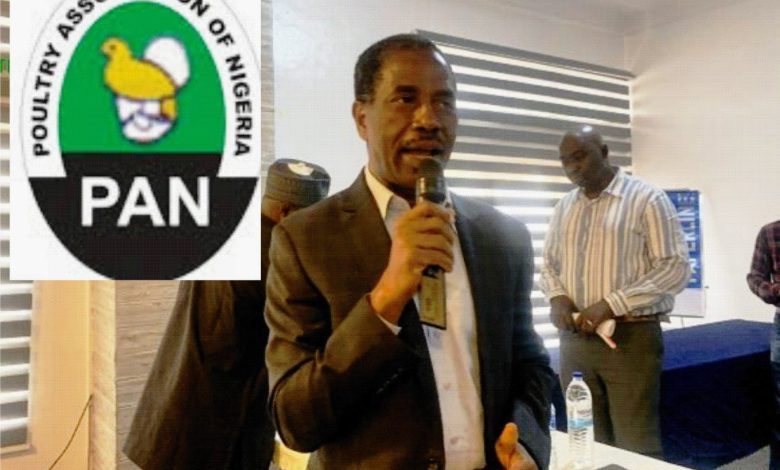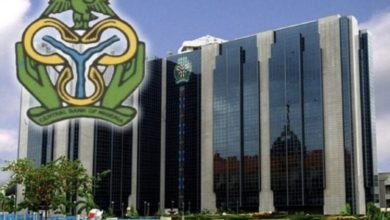PAN suggests pathways to salvage the industry from imminent collapse

The Nigerian poultry industry finds itself in a precarious position, confronted with an array of challenges, ranging from soaring feed costs to policy dilemmas; hence the Poultry Association of Nigeria (PAN) Central Working Committee, led by its National President, Ichie Sunday Ezeobiora, made a courtesy visit to the Honourable Minister, Federal Ministry of Livestock Development, Idi Mukhtar Maiha, and presented a paper on the way forward.
PAN said in the paper that “the alarming and negative narration of the situation of the poultry industry today is that the fortune of the industry is nosediving, leading to the closure of some poultry farms for the obvious reasons known to all of us.
While the government has come up with various agricultural programs and policies to boost poultry production in the past, it appears that the tempo and zeal are not being sustained.”
While reflecting on the grain situation of the country, PAN said that “the soybeans’ production and harvest have never been as encouraging as they ought to be; it ought to be less than 700,000 metric tons, while the poultry industry annual requirement is about 1.0 million metric tons.
Therefore, the country may have to import some quantities of the commodity to be able to meet the needs and requirements of the poultry industry as well as other industry needs such as oil millers, etc.”
“That the Federal Government will have to intervene immediately to stop the export of soybeans, both seeds and soybean meals (SBM), especially maize, to any part of the world while imploring the Central Bank of Nigeria (CBN) to discontinue with immediate effect any form of incentives to exporters of critical commodities that are in short supply in the country, considering first the national food security of the people and the country.”
The Association also decries the situation whereby it can now hardly differentiate between fiscal and monetary policies and which organ or body of government is responsible for the fiscal policy of the country. Stressing that there should be a clear distinction between economic and monetary policies and the ambiguity of their implementation.
Maize, also being the most critical ingredient in the production of poultry (about 4.5 million tons needed by the poultry industry alone), is at the moment at the highest prices, thereby making the business of poultry production very difficult since maize and soya constitute about 80% of the cost of poultry production.
Reacting to some of the government’s policy issues and strategies, PAN stated that in order to assist and ameliorate the current challenges facing the poultry industry in the country, tariffs on all imported micro inputs for poultry production as well as equipment be made zero duties and other taxes exempted, as this will greatly reduce the high cost of production exacerbated by the devaluation of the Naira, arguing that this will help to further create wealth and employment for Nigerians.
“The issue of multiple taxation on agricultural commodities and products of the poultry industry by the various States Internal Revenue Boards or Agencies should be critically looked into by the Joint Tax Board with the possibility of abolishing all illegal revenue collection agencies or task forces.
The Federal Ministry of Finance and the Federal Inland Revenue Service (FIRS) have great roles to play in this matter.”
PAN, however, urged the government to reinforce quality control measures for feeds and inputs that will guarantee standard and quality supply to the poultry farmers at every point of production; adding that there should be deliberate efforts to develop critical poultry infrastructures and value chain enhancement, especially for the underprivileged in the society.
“Sustaining the current import restriction policy on poultry and poultry products, especially frozen poultry products and table eggs, into the country. We are very aware of the campaigns by Western powers and their local collaborators for the lifting of the ban on the importation of frozen poultry products into Nigeria. Such a move will further impoverish the country and will make the country a dumping ground for all poultry products.
“Promoting pro-poor rural poultry development programs by increasing investments in rural infrastructure, agriculture, research, and development. This will assist in reducing the rural–urban migration of youths, as both the youths and women could be strong agents for poultry development.
“Re-orient social safety nets to eliminate or drastically reduce poverty and hunger, create good living and well-being, and ensure gender equality, women empowerment, and sustainable production and consumption towards achieving critical goals of sustainable development.” Social safety nets in poultry production empowerment are a more sustainable way of mitigating poverty.
“Exploring and exploiting new opportunities created by the revolution in the poultry industry for high-value production and marketing of critical raw materials and poultry products such as meat and eggs and other services.
This calls for the need for poultry products to drive exports, at least to the African nations that Nigeria has a comparative advantage over,” the statement reads in part.
PAN, however, recommended sustainable livestock growth and transformation by the creation of a special Poultry Development Fund under the new agency known as the National Agricultural Development Fund.
Noting that we need to move from rhetoric to action, reform policies, and create a favorable business environment, make the market work for the poor and therefore restore and conserve natural poultry resources. Create legislation that makes it compulsory for every poultry producer/farmer and other allied service providers to become members of the association.
Such legislation could easily be facilitated by an Executive Bill to be sponsored by the Federal Ministry of Livestock Development (FMLD).





